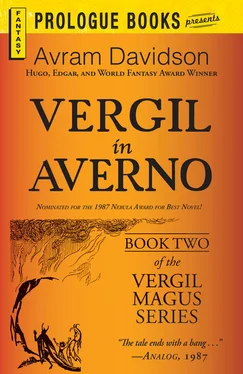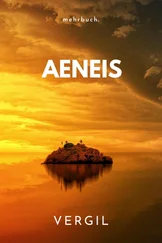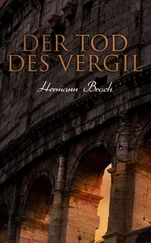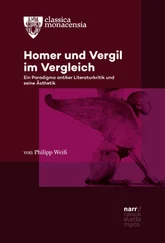Avram Davidson - Vergil in Averno
Здесь есть возможность читать онлайн «Avram Davidson - Vergil in Averno» весь текст электронной книги совершенно бесплатно (целиком полную версию без сокращений). В некоторых случаях можно слушать аудио, скачать через торрент в формате fb2 и присутствует краткое содержание. Жанр: Фэнтези, на английском языке. Описание произведения, (предисловие) а так же отзывы посетителей доступны на портале библиотеки ЛибКат.
- Название:Vergil in Averno
- Автор:
- Жанр:
- Год:неизвестен
- ISBN:нет данных
- Рейтинг книги:3 / 5. Голосов: 1
-
Избранное:Добавить в избранное
- Отзывы:
-
Ваша оценка:
- 60
- 1
- 2
- 3
- 4
- 5
Vergil in Averno: краткое содержание, описание и аннотация
Предлагаем к чтению аннотацию, описание, краткое содержание или предисловие (зависит от того, что написал сам автор книги «Vergil in Averno»). Если вы не нашли необходимую информацию о книге — напишите в комментариях, мы постараемся отыскать её.
Vergil in Averno — читать онлайн бесплатно полную книгу (весь текст) целиком
Ниже представлен текст книги, разбитый по страницам. Система сохранения места последней прочитанной страницы, позволяет с удобством читать онлайн бесплатно книгу «Vergil in Averno», без необходимости каждый раз заново искать на чём Вы остановились. Поставьте закладку, и сможете в любой момент перейти на страницу, на которой закончили чтение.
Интервал:
Закладка:
Where Averno had stood (stood? say, rather, squatted), nothing stood now. No fragment of its black walls remained to view. Down the bed of the canal, propelled by a fierce and scouring flood, still rolled one great torrent of boiling mud, though slackening as they watched, and poured into the sea, hissing as it poured; and yet a second, smaller sea of it remained. . remained forever: Lake Averno, it came to be called, a lake of not-quite-lava, a vast bog of bubbling muck, a surrounding swamp of seething earth and slime and stinking gas, with here and there and there and now and then a spurt or jet of flame. And bubbles, like bubbles of black blood.
What “the good gods of hell” had given, and given to make the Very Rich City very rich, they had, it seemed, given ever grudgingly. And now they had claimed it all and taken back again.
They. And “Sissie and cruel Erichtho.”
“The revenues of the South will never recover,” the Viceroy had said, bleakly. Doubtless never. As for the Viceroy’s own revenues, the following year for the first time he was to decline his exemption from the pro-consular lots. Into the urn with the other names had his own name gone, as (he having been of course at least once a consul) go it otherwise must have gone long before. He had (it was said) not even bothered to see of which province he had drawn the governance — grain-great Sicily, Aspania deep with silver, Chaldea the Far with its femminate men and bearded women, or distant, misty Picti-Land — but had merely handed the summons to his secretary with the single word, “Prepare.”
Admirable.
No doubt.
But that was for the next year, and that was for the Viceroy. As for Vergil, and for now, what? For as for Averno: nothing.
Iohan had stood with them, so pale and drawn that Vergil would have been shocked, had not the greater, the unspeakably greater shock been spread out before them in what they had not yet learned to speak of as “Lake Averno.” Casca was long silent (Vergil, totally silent, though his mind screamed several names, and over and over again); then Casca said, “It is just as well that I find I do not remember the name of whatever philosopher it was who said that the truest happiness possible for a man was to stand safely on a cliff in a storm and, watching a ship being sunk beneath the cliff, thank his guardian genius he was not aboard. I. . somehow. . I do not feel such happiness. Or any happiness at all.” And at this Iohan had given a shuddering sob, then turned away his face and covered it with one hand.
On their way back to the small port city that was now, once again, home, Iohan — save for the few short questions and replies required by the performance of his usual work — had said nothing. It was not until (with no cry at all of thalassa!) they once again espied the sea that Iohan, having once looked back at the thin smudge of smoke which alone now marked upon the sky, murmured something else. It being too low for his master to hear, his master, after an abstracted moment, turned his face and raised his brows. “They did be canny things, them arts of fire and metal,” the boy said. Then, an instant later, in a dogged tone different from the tone of puzzled memory, remarked, “They do be canny things. . them arts of fire and metal.”
“Yes,” said Vergil. And, “We are nigh safe home.”
The mare now turned again her head and gave him that characteristic, almost arch, look. He stroked her muzzle. “Thou good beast. . served me well, well, well…. I cannot keep thee, though.” She flung her head, still looking at him. Then it seemed as though, even whilst they regarded one another, that something dulled and dimmed in her eye, her head turned round and down, and she ambled on the road. And thus reminded of the essential and essentially unexisting details of quotidian life, Vergil said, “Iohan, when we are to my lodging-place, tend the mare as best you can. . and. . ah! yes! see that you give her a double handful of the best white barley….” Iohan nodded, nodded; unchanged, that wan, drawn look; and why “changed,” should one expect it to be? Solely that a horse might eat, and eat, however scantly, well? “ — and then. . Iohan. . I intend presently to speak you, about your. . our. . arrangements. . employment. . and then — Iohan — the mare must go back, of course, to Fulgence — so bring her back. Tell him to prepare his account. I shall. . presently …”He moved his hand. What need of words. The boy nodded, nodded. They did not, man and master, look each other in the face. There was no need.
— Later, Vergil sat, blank, exhausted, in the sole chair in his rented room, the confused memory of the return from Averno unreeling before his eyes as though some tapestry or painted cloth upon two great spools. Charge: one penny for the Commander of the Legions (one shrug had he given at the sight of the site where once Averno had crouched). The Commander of the Legions. . what time the Viceroy of the South had said something close to the Commander’s ear, gesturing the while to Vergil; what had the Commander of the Legions said? — Nothing. What had he given Vergil? For that matter, what he owed Vergil? Nothing. He had given one shrug and he had given Vergil two decades of troops — they must return that way anyway — two decades of troops to company Vergil, his mare, his man, as they returned — lagging, lagging — aware of a total absence of joy. Suppose Sisyphus to have been acquitted his need of forever toiling up his hill in Hell, would he have made the last journey in joy? Or would mere fatigue have extinguished all other emotion, as a torch extinguished in a sconce? The troops were useful, very useful, the troops kept apart the hordes they met upon the roads. Hordes, hordes, some mere seekers after curiosity. “Master, Master, what happened?” — Some, so many some as to exhaust all pity. “Master, hast ‘ee heard of such a one? my son? my daughter? my sister’s son? Master, master, has thee heard?” He had not heard. And those who asked him naught, and told him naught, but did their best to avoid the soldiery, men of grom glance with many an unsaddled horse and mule and many an empty sack and cask and box, for who knows what they had hoped to find, for the tugging out and for the picking up? Nor did they dare purse lips to phrase the words their faces and their glances saith well enough: salvage. . plunder. . loot …
Later, then, Vergil sitting, blank, exhausted, in his chair in rented rooms, now and then some thought coming straying to his wasted mind, as Cadmus was made king in order that the king must die, there being no greater sacrifice than the sacrifice of a king, or. . many times, uselessly uselessly: Whence came Cadmus, and what his early tale? . . there came again Iohan, all but dead with trudging and fatigue and latent, latent shock, saying:
“Master, Fulgence gives you full quittance for the steed, and he says, says Fulgence, ‘There is no accompt, all is paid; if you are well, it is well, and he is well …’ ”
Some long while silence buzzed in Vergil’s ear. Then he arose. “Iohan, youth is your blessing and youth shall be your cure, so lie you down and rest; I shall be some small while gone.” And down he went the ladder to the level ground, and began to walk the streets, no destination in his mind, no purpose, no explanation, only some thought of the few coins still in his purse: how he would divide them with the boy, and then — But there was, really, no “… and then …” — Whom should he meet?
A woman, certainly not young, surely not yet old: the favored house-servant of the Matron Gunsedilla; what was the she’s name? He knew it not; she knew him well. Up she flung her arms, and “Ah! Master Vergil! the gods be praised for having brought you safe again, grains and incense and drops of the best wine I will be offering them, for glad I am to see you — ”
Читать дальшеИнтервал:
Закладка:
Похожие книги на «Vergil in Averno»
Представляем Вашему вниманию похожие книги на «Vergil in Averno» списком для выбора. Мы отобрали схожую по названию и смыслу литературу в надежде предоставить читателям больше вариантов отыскать новые, интересные, ещё непрочитанные произведения.
Обсуждение, отзывы о книге «Vergil in Averno» и просто собственные мнения читателей. Оставьте ваши комментарии, напишите, что Вы думаете о произведении, его смысле или главных героях. Укажите что конкретно понравилось, а что нет, и почему Вы так считаете.












